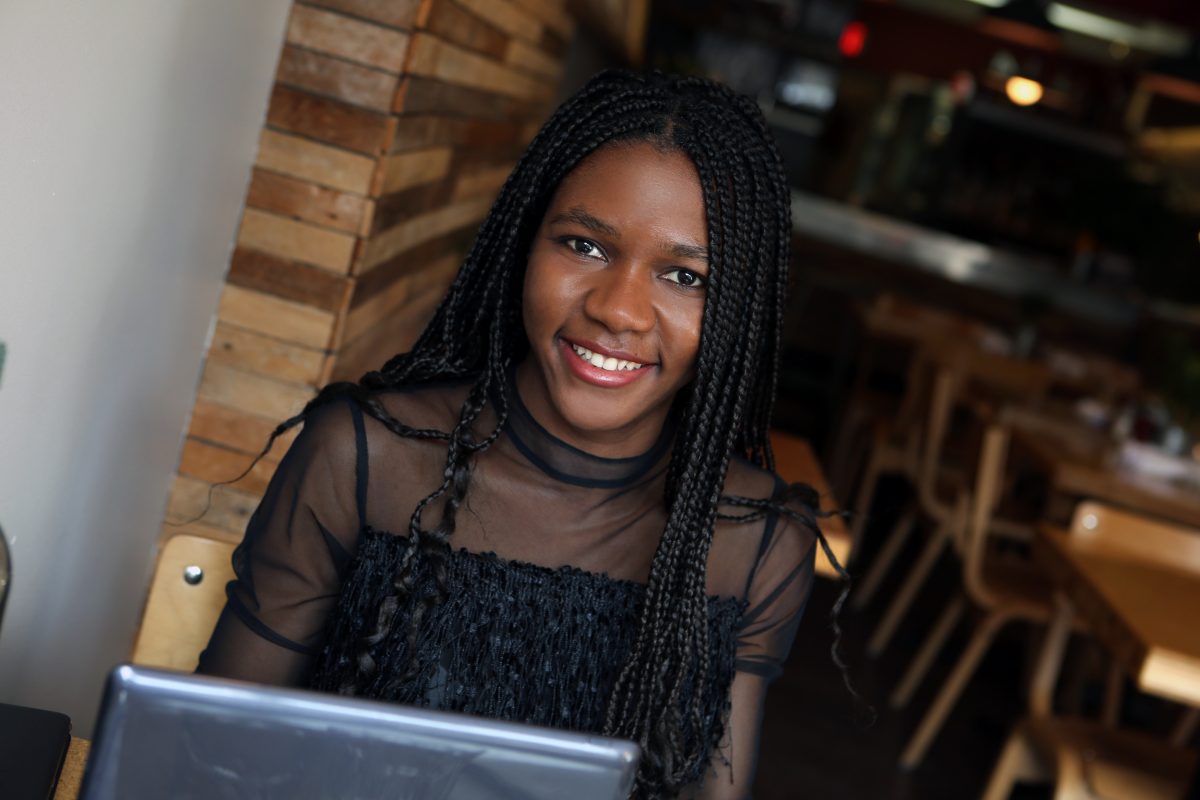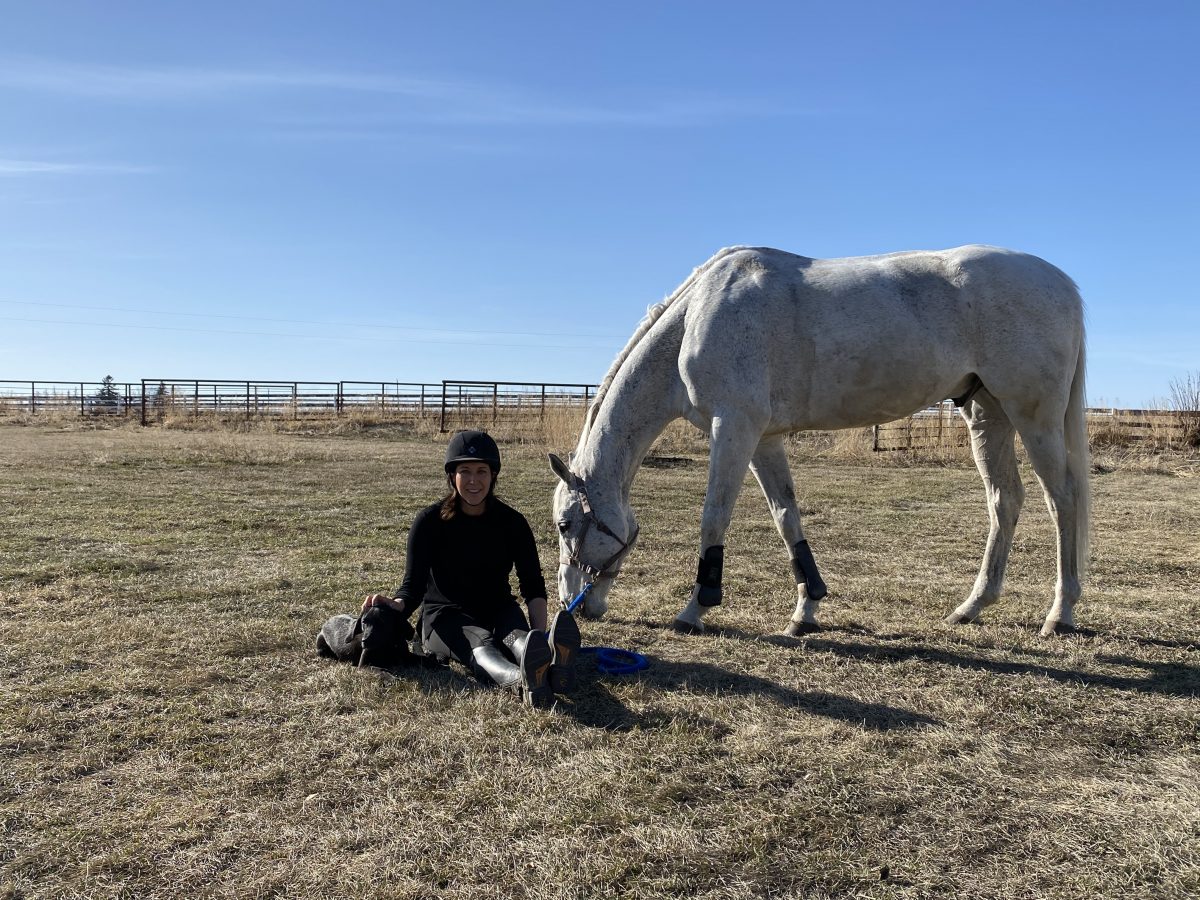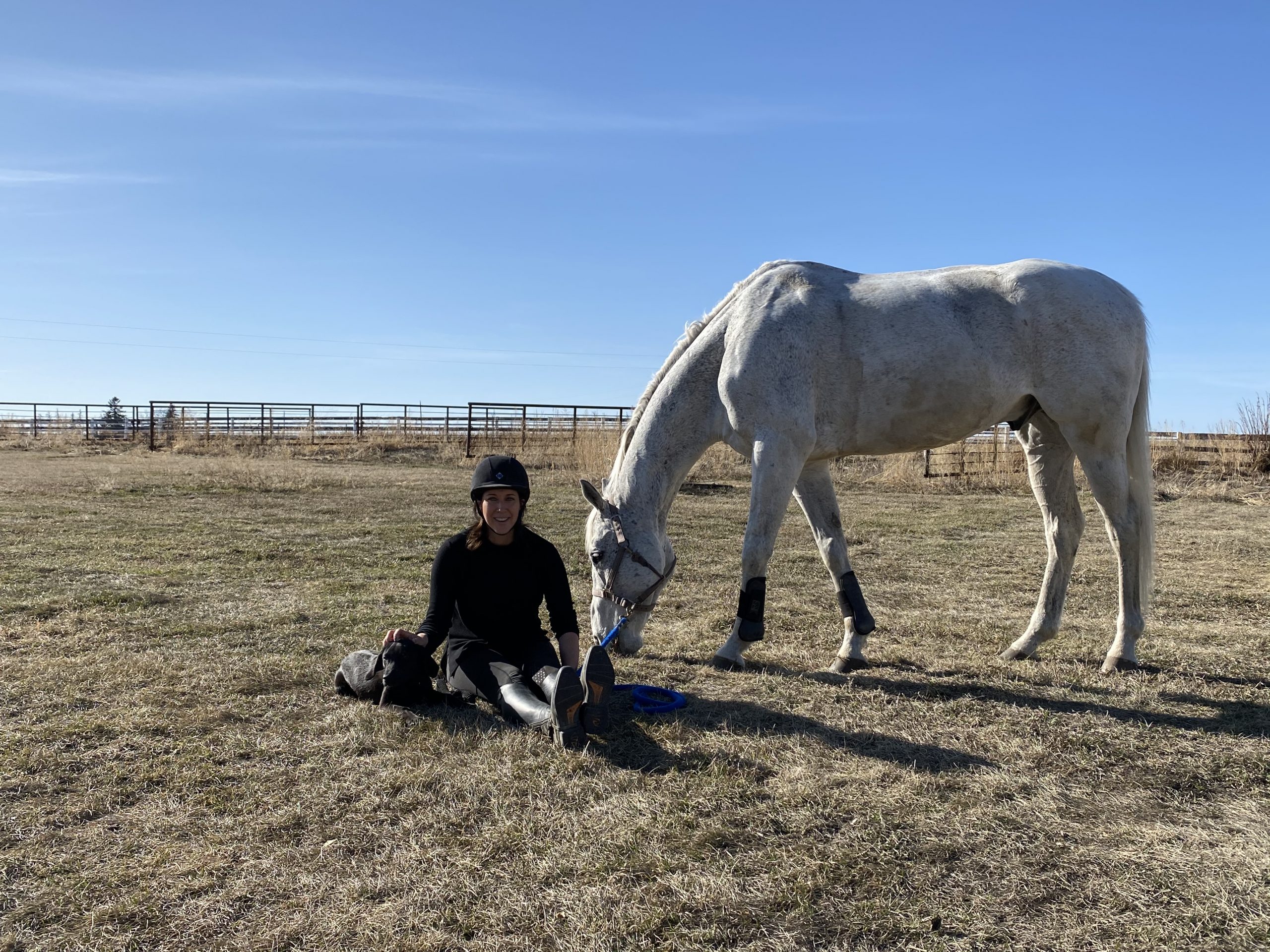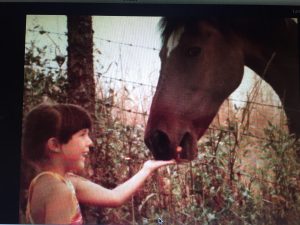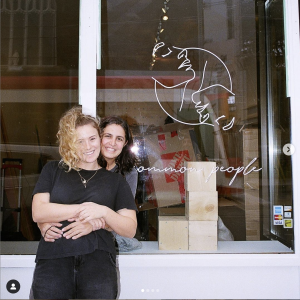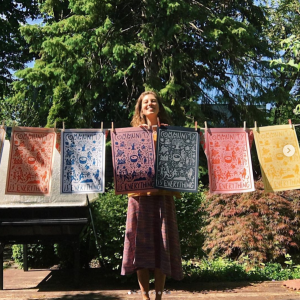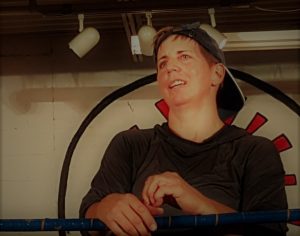
Storytelling transformed Hermine Mbondo’s life and continues to shape her work to this day.
Born in Cameroon into the Bassa tribe and raised in France, Mbondo now lives in Toronto. She fondly remembers her childhood and all the stories she heard when she visited her grandmother’s village. Back then, every night Mbondo would gather with all of the other kids in the family to listen to stories told by her grandmother and her aunts.
But these stories were not ordinary fairy tales.
“When you are a child, you don’t realise [right away]. But then slowly, you realise the stories were not just fairy tales,” Mbondo says. “It was really about either warning us about things or teaching us about something.”
One of the stories Mbondo remembers vividly is a different interpretation of the story of the tortoise and the hare.
In Mbondo’s version, the hare tells the tortoise that both of them should kill their mothers because there was a poor harvest and everyone in the village is going hungry. The hare says they can use their mothers for a feast. The tortoise is tricked by the hare and kills its mother, but the hare does not.
Mbondo says the moral of this story is to choose your friends wisely and be careful about who you trust. She says the stories she heard as a child, while sometimes scary, were always meaningful and were meant to teach life lessons.
Flash forward many years and Mbondo is now sharing her own meaningful stories through B4brand — a branding and marketing agency she founded in Toronto in 2017.
An Accidental Marketing Agency
Like many women entrepreneurs, Mbondo didn’t start out thinking she wanted to be a business owner someday. Within a few months of job hunting after moving to Canada in 2016, she realized that as a newcomer, landing a job and pay cheque that matched her level of experience was going to be impossible.
“I was still able to do a lot of things but it wasn’t at the level of what I was doing — or earning — in France. I was the head of marketing there,” she says. “[Work I was hired for in Canada] wasn’t challenging enough. There was nothing to justify [staying] — plus I didn’t have the same kind of salary. After a year, I was starting to think, ‘What can I do next?’”
Around the same time, a company that Mbondo had worked for back in France asked if she would be interested in moving back to lead their marketing department.
But Mbondo didn’t want to move back to France. She knew the job being offered to her would return her to the same position of working for someone else, on their terms, with no room for growth. By this time, she knew she wanted to call the shots and work “with” the company instead of “for” it. Pitching the idea of being an independent contractor led to her landing her first client as a solepreneur. They worked out an arrangement that allowed Mbondo to have more autonomy in her work, and in late 2017, she officially launched B4brand, which now operates as an incorporated marketing agency.
Marketing with Purpose
In a competitive industry like brand management, B4brand stands out in three distinct ways: 1) it focuses on people-driven branding, 2) it has the capacity to work seamlessly in both of Canada’s official languages, and 3) it makes innovative use of Bassa storytelling culture.
Mbondo says that while all three aspects of her enterprise are important, the emphasis on people-driven stories is the foundation that grounds her and her business. Engaging with clients whose values align with her own has led her to work with brands that focus on the needs of people rather than the features or benefits of a given product.
“I’ve seen different things in marketing — I’ve seen the good, the bad, and the ugly. Marketing can be used to trick consumers into purchasing products or services. I wanted to do things differently,” she says.
Mbondo wants consumers to connect with brands that align with their own ethics and principles so that ideally, they make purchasing decisions based on shared values.
“I talk with the business owners, get to know them, and try to understand not just what they’re doing, but why they are doing it,” she says, “because for me, it’s very important to understand the ‘why.’” The conversations are litmus tests that help her choose brands that, in her words, truly “have a greater purpose.”
For example, when an opportunity came her way to work with an entrepreneur who was looking to launch a new line of spices from Western Cameroon, Mbondo first researched to find out if they operated in an ethical manner. She sealed the deal after learning the company was paying their employees fair wages and creating a safe working environment for women in western Cameroon.
Through her work, Mbondo wants to challenge the idea that industries like brand marketing can only be made more inclusive by hiring diverse employees. While this is important, she says it limits the possibilities of human resources. What she wants to see instead is an emphasis on the diversity of products and services as well as the diversity of people. The international spices are an example of this because they bring “diversity to the shelves” of mainstream grocery stores. While the spices have not yet been launched officially, another client of Mbondo recently launched.
“I think for me, the way I see diversity and inclusion is in the everyday things, and food is part of that [when] we go grocery shopping.”
Passion Projects Helping Build Community
Another passion project of Mbondo’s is the Global Impact Hub — a one-stop learning hub for social entrepreneurs to connect, educate and amplify diverse voices.
Mbondo has partnered with several organizations over the past few years to provide bilingual entrepreneurship training to fellow entrepreneurs and small business owners. During the COVID-19 global pandemic, she found that many such organizations didn’t have the tools, resources, or knowledge to transition online.
Mbondo explains, “[Entrepreneurs and small business owners] usually wear many hats and they are overwhelmed. Sometimes, all they need is the little push, especially since the road to running a successful business while making a difference can feel difficult and lonely. So, I decided to support them by offering a place to develop supportive relationships with fellow game-changers as well as access marketing tools and resources.”
The Global Impact Hub aims to combat this overwhelm by creating space for entrepreneurs to work it out together.
“Through this membership-based online platform, social entrepreneurs will be able to sharpen up their marketing skills from anywhere and at any time through valuable content [like] marketing resources, tools, workshops and meaningful ways of connecting.”
Finding Community Through Shared Experiences
As a newcomer and female entrepreneur, Mbondo’s participation in startup business development and accelerator programs played an important role in helping her build B4Brand.
After starting the enterprise on her own, she learned valuable resource management skills in a program for newcomers to Canada called the Newcomers Entrepreneurship Hub alongside others who were also starting their own businesses. The Fifth Wave feminist accelerator program for women in digital media, operated by the Canadian Film Centre’s MediaLab, showed her how to hire and manage independent contractors whose values aligned with her own on a per project basis. Today, she has the structures in place to contract like-minded freelance graphic designers and copywriters to create campaigns that everyone feels good about.
Three years into running her own business, Mbondo says that financing growth continues to be a struggle. Growth accelerator programs however, have helped her to connect with other business owners and funders who make her feel less alone and boost her confidence, helping her to keep going even when things are difficult.
“Everybody’s going through the same struggle — on different levels, obviously, but we’re going through the same things so it gives some reassurance to be like, ‘Okay, I’m not the only one,’” Mbondo says.
Marketing at its core is a form of storytelling. What motivates Mbondo to show up for work every day is the opportunity to combine her love of people-driven stories rooted in culture, history and tradition with the personal values she shares with her clients.
“I still love stories. I also learned that as an independent business founder, you can be choosy about the clients you work with and I’m supporting causes with my work,” Mbondo says. “I somehow managed to do well by doing what I love and wanted to do as a child.”
Last year, Mbondo was listed as one of Canada’s Top 100 Black Women to Watch in Canada.
This year? B4brand is a finalist for the 2021 Toronto Star Readers’ Choice Awards in the Best Advertising/Marketing Agency category. Voting continues until Sept. 19, 2021.
Publishers Note: B4brand is a part of the Fifth Wave, a year-round program offered by CFC Media Lab and its partners to support the growth and development of women entrepreneurs in the digital media sector in southern Ontario. All enterprise founders in the Fifth Wave community are selected for both their potential and commitment toward weaving intersectional feminist ideals of equity and fairness into sustainable and scalable business growth strategies. Fifth Wave Initiative is committed to 30% participation by members of underrepresented groups. The Fifth Wave is a LiisBeth Media partner and ally. Applications are OPEN! Apply here
Related Reading

“How Can We Support You?”
Immigrant Women in Business (IWB) strives to lift up and empower new Canadians venturing into
entrepreneurship
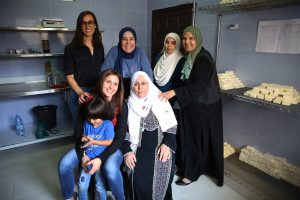
By Refugee Women, with Love
A Toronto-based social enterprise brings hand-pressed soaps made by refugee women in the Middle East to North America.

The Cure for the Start-Up Incubator and Accelerator Gender Gap: Accountability
Gender oppression among women, trans, queer, and the intersectionally defined is a well documented issue in tech startup spaces in Ontario, Canada and North America at large. Calling for public accountability can help.



